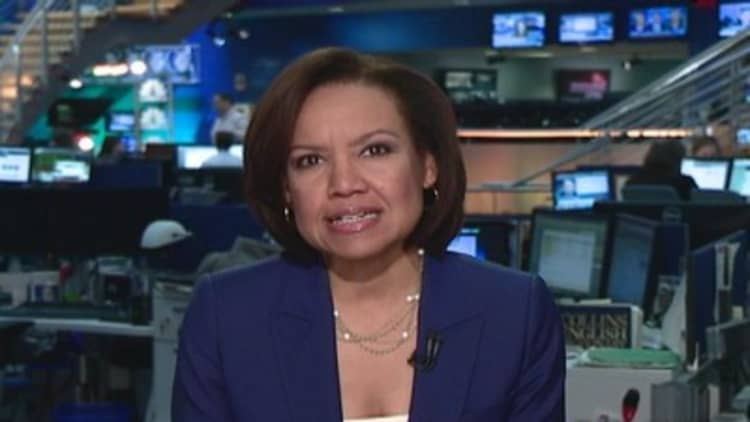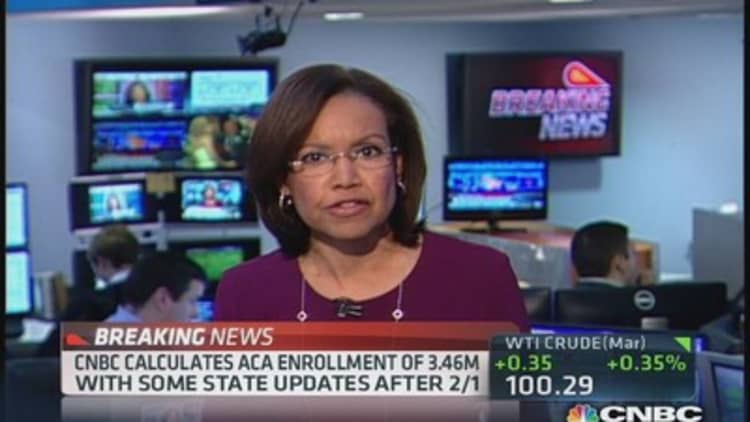
Large employers remain committed to providing their workers with health benefits for now, despite rising costs and more regulation under Obamacare. But three out of four big firms aren't sure they'll still be doing it by 2025.
"That is very much a function of the uncertainty swirling around in the health-care landscape right now," said Randall Abbott, senior health-care consultant at benefits advisory firm Towers Watson.
Executives at 95 percent of major companies said subsidizing health insurance for active employees would continue to be an important part of compensation programs for the next few years, according to the 2014 large employer survey conducted by Towers Watson and the National Business Group on Health.
Longer term, only a quarter of the respondents expressed confidence that their firm would still offer employee health coverage 10 years from now. That's a record low reading in the 19-year history of the employer survey.
(Read more: Another Obamacare test: Keeping co-ops afloat)
"It's the highest degree of uncertainty we've seen," said Abbott. "It has been exacerbated by ACA."
One big reason: the so-called Cadillac Tax. In 2018, under the Affordable Care Act, high-priced employer-sponsored insurance plans will trigger a 40 percent excise tax on insurance benefits in excess of $10,200 for an individual and $27,500 for a family plan.
Cadillac Tax threat
Towers Watson estimates that nearly two-thirds of employers will be faced with the tax starting in four years. Many companies are trying to get ahead of the game by paring costs and bringing benefit plans in line now.
The industries facing the biggest exposure to the tax are those with highly compensated employees, including Health Care, Technology and Financial Services. All three saw plan costs in 2013 well above the ACA excise tax threshold.
(Read more: Meet Oscar: A techie insurer primed for Obamacare)
In the health-care industry, the median cost of a single employee health plan last year was $12,805, according to Towers Watson; the median cost in high-tech firms was $12,593, while in financial services, it was $10,828.

"If you're at the high end of that spectrum,you may have a need to make more aggressive change faster than others in that industry," Abbott said.
Focus on cutting costs
One of the areas where large employers are cutting back is on spousal coverage. Nearly half of those surveyed made employees pay more of the cost to insure their spouses in 2014, while a quarter of the firms added a monthly surcharge to cover spouses who can get insurance through their own jobs.
Firms have also increased their offerings of more consumer-oriented, high-deductible plans, while also shifting more of the overall costs of insurance to their employees.
Executives are also eyeing cost-containment trends from the new private health insurance exchanges from leading providers including Towers Watson, Aon Hewitt and Mercer, a unit of Marsh & McClellan.
(Read more: Hospital cuts out the middleman and sees success)
Aon Hewitt's corporate health exchange is now entering its second year of operation, serving 600,000 employees from companies that include Darden Restaurants, Sears and Walgreen.
The average cost for employers renewing on the Aon Hewitt exchange in 2014 rose just over 5 percent in 2014, including new Obamacare fees. That compares to an average of 6 percent to 7 percent increase for most major employers, according to industry estimates.
"The savings are due to competition," said Ken Sperling, Aon Hewitt's health exchange strategy leader. "Wherever you look at a retail market place, when you have competition, prices go down."
Analysts are predicting that by 2018 enrollment on the private exchanges will be even higher than enrollment on the public Obamacare exchanges, in part because of the looming Cadillac Tax.
"No employer wants to hit the excise tax," Abbott said. "Between now and 2018, they are going either to have to aggressively manage their self-managed plan to stay below the threshold, or they're going to look to buy a solution from a private exchange."
—By CNBC's Bertha Coombs. Follow her on Twitter @berthacoombs.


